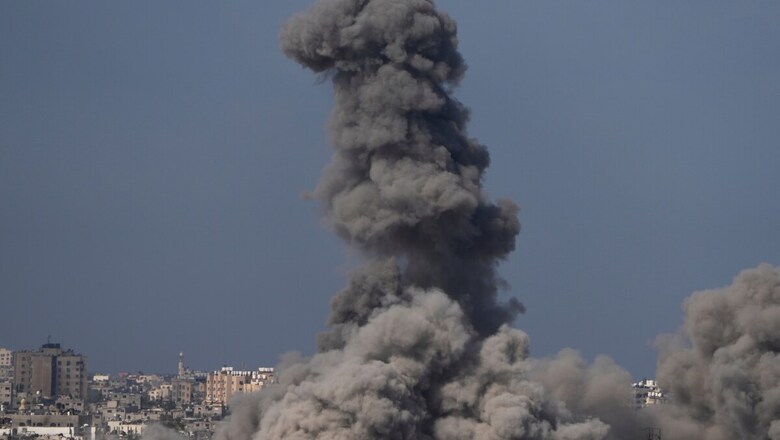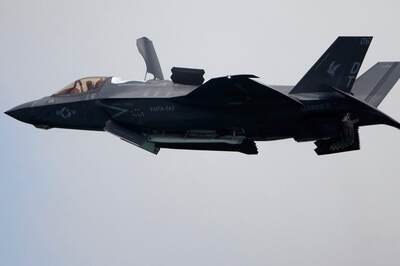
views
It takes a lot of courage, especially for a reigning American President running for a second term in a year’s time, to confess to the nation’s ‘failures’ on the international arena and in public. Maybe Democrat Joe Biden was in effect running down his rival Republican predecessors, but for him to publicly ask Israel not to repeat America’s ‘post-9/11 mistakes’, is saying a lot.
Clearly, Biden was referring to the lessons that the US has learnt in an emotion-charged, political propaganda of a counter-terror attack on Afghanistan, and urging not just Israel but the rest of the world, too, not to repeat its folly. And the ‘folly’? Of unthinkingly and almost purposefully over-reacting to 9/11 by destroying the whole of Afghanistan for no fault of the ordinary citizens, or not even the retrograde Taliban regime, when Al-Qaeda and Osama bin Laden alone should have been their only targets.
After burning thousands of Afghan homes and lakhs of their inhabitants in aerial bombing, leaving the mountainous arid nation worse, the US beat a hasty retreat, leaving the once-despised Taliban back in control of what has always remained an ‘uncontrollable’ nation and people for the white man for centuries. Ironically, the US picked up Osama, for which there was enough justification, not in Afghanistan but in the ever-friendly Pakistan next door — and for the next ten years since 2011 did not know how to exit from the scene, with or without compromising national pride, if any, one more time — after Shah’s Iran, Marcos’ Philippines, and of course Vietnam, where it all began as for as this part of the world is concerned.
Thus, the uncomplicated American message for Israel is not to overdo its retaliatory attacks of the Gaza people, after the Hamas had landed the most humiliating and destructive attack on the Jewish nation ever. That the Jewish toll in the multi-pronged Hamas attack was the highest post-War speaks volumes. It does not end there, however.
Under American pressure, by Biden in person, Nethanyahu has agreed to Egypt opening a route to besieged Gaza, for UN aid-providers to move in 20 truck-loads of food, medicines and other essentials. How far and how long will it have to go, and can go is a question that cannot be addressed instantly. But more the Israeli determination to raze the Gaza settlements to dust, even more determined will the ‘victim community’, and not just in that location.
As the Jewish nation should have known from the history of its own birth, making and survival, the more you think you have hurt, humiliated and destroyed your targets in a vengeful way, greater will be the vigour and vengeance with which they re-group, recruit and retaliate in kind. That is what really happened when Hamas attacked Israel this time, more than any time in the past several years.
Mossad’s failure
Call it an act of terrorism or freedom fight, enough has already been said and written about how Hamas has humiliated international intelligence and counter-intelligence icons in the Israeli Mossad. As was to be expected more under the present circumstances, Israeli Prime Minister Benjamin Netanyahu has vowed to avenge Hamas’ missile attack. In Israeli lingo, it has always meant laying waste to Gaza one more time, implying that the retaliation would be unmatchable and unforgettable. Will it be the last time, and/or will there be a ‘Palestinian’ Gaza left after it?
The Mossad’s failure is only the second of that magnitude from an intelligence angle, and the comparison should stop there. The American CIA-FBI record about predicting and preventing 9/11 is the greatest of all intelligence failures in the post-War world. Next comes the twin-episode: the overnight collapse of the Berlin Wall and the equally high-profile collapse of the Soviet Union. Outside of the global intelligence community, Mossad’s failure in Gaza this time ranks lower.
Be it the post-9/11 American retaliation or the current Israeli counter-attacks, they would have to be disproportionate if only to send out a strong message to the other side(s) — and also to make the home front and the rest of the world forget your humiliation. Thus, the US coined the ‘axis of evil’ phraseology to spread out its deflective tactic, possibly acknowledging that taking out Osama bin Laden is not an immediate option.
Worse response
Netanyahu has now declared that Israel did not start it but will end the ongoing war and will exact a price that “will be remembered by Hamas and Israel’s other enemies for decades to come”, again meaning that Mossad could well go after militant Palestine groups and leaders across the world, as they had done in the case of mass exterminators of Jewish people in Nazi Germany. Or, will it be worse than the original, if not only anti-Israel terror groups but, more so, the whole world has to remember it?
There may be an inherent problem. Israelis do not like body bags, which have already been filled without their asking this time. The nation does not like hostages either, but then Hamas has taken hostages by raiding the border areas, using the missile attack as a ‘cover’. For now, they have said they won’t negotiate, but every hostage situation is a serious business, more serious with the passage of time than the other way around.
Even as the Israeli defence forces take on Hamas in front of them, Mossad may have begun its counter-offensive by checking on the number of hostages, their nationalities, and where they are held. Whether Israel can afford and also succeed in an Entebbe kind of operation way back in 1976 is among the questions uppermost in the minds of many analysts. In what was then code-named ‘Operation Thunderbolt’, rechristened as ‘Operation Yonatan’, post facto, Israeli counter-terror forces stormed a hijacked Air France Tel Aviv-Paris airliners, securely held by the hijackers at Entebbe airport in Idi Amin’s Uganda.
The less-discussed aspect of Hamas attack is the way their missiles possibly penetrated the American ‘Iron Dome’ anti-missile air cover across Israel’s airspace. No details are available just now, but either the Iron Dome was non-operational when Hamas’ attack happened or it had failed — even if only a few of Hamas’ missiles had sneaked past the anti-missile cover, given that their numbers are variously put at 5,000 by the attacker group and 2,500 by Israel. Other suppliers of such anti-missile cover, like Russia (the S-400 system), their users (like India), and prospective buyers of either or any other of the kind, too, would be taking a much closer look.
Targeting the source
This one takes us back to Mossad’s failure(s): How could anyone smuggle in so many missiles into Gaza, which was thought to be under non-stop Israeli security cover? What about the support systems and logistics of moving them all from somewhere outside the region and installing them for coordinated fire inside Gaza? If news reports say that the attackers used hang gliders, where did they train?
Of course, Israel would soon come up with the origins and make of the missiles, and possibly they would have the details. Does it mean that they would target the source of the missiles if it is within their military or Mossad reach, whether it is a state or non-state actor elsewhere? Or, if it is too big an operation for Israeli forces and/or agencies to carry out, will their Americans and other friends step in to lend a helping hand?
If so, what kind of help and assistance would Israel seek, and what kind of help and assistance would each of those western countries that have condemned Hamas for the attack extend? These countries, almost as always, have refused to date back Hamas attack to what others say was the ‘Israeli occupation of Arab/Palestinian territory’. But they have all been dithering for some time now over supplying weapons to Ukraine.
Sympathy, empathy
If the US and the rest of the West have backed Israel to the hilt, nations like Iran and Russia have supported Hamas (and possibly other ‘freedom’ movements and militias of the Palestine people). Iran is said to be the benefactor of Hamas and other Palestinian militias or terror groups. Russia, still caught in the Ukraine War, has referred to the two-nation theory and the need to enforce it. That is Israel and Palestine as two separate nations, living their lives and feeding their people.
Here, Prime Minister Narendra Modi’s social media message, sympathising and empathising with the ‘innocent Israeli people’ has not gone unnoticed, either inside the country or outside. Independent of which side Modi took and what he said, in the normal course it would have been left to the official spokesperson of the Ministry of External Affairs (MEA) — at least until there was greater clarity about the ground developments and also about the fate and future of Indian citizens possibly caught in the cross-fire overseas.
India’s current position on the Israel-Palestine question is at clear variance from the decades-old policy, including that of the earlier BJP Prime Minister Atal Bihari Vajpayee. While nations and governments are free to apply correctives to past policies — as has happened to India-US bilateral relations since the end of the Cold War — whether the Palestine issue is a zero-sum game that could be reduced to a ‘terror attack’, whose victim India definitely has been for long, is a stand-alone question. Or is New Delhi now seeking to differentiate between moderate Palestinian leaderships and their militant avatars, whose actions in support of their cause are terrorism per se?
It was the Modi government’s approach in the early weeks of the Ukraine War, as thousands of Indian students were known to have been caught in the war zone. Though the West criticised India’s neutrality in the beginning — and continues to do so at times — by staying away from controversy, New Delhi could play up the humanitarian aspects with the two warring nations to ensure a safe journey back home for every Indian stuck in Ukraine.
As coincidence would have it, India’s passivity in those early days set the mood and methods for the import of Russian crude when the war hit global oil prices and also the food and fertiliser trade. Will it now be lost in the new theatre, where Hamas is not going to like what they would have read about India’s position?
New-found love
Incidentally, most of India’s smaller neighbours seem to have either sided with Hamas or recalled the two-nation theory, thus indicating policy continuity, independent of their past and current leaderships. A stand-alone Indian stand, which is also seen as a deviation from the nation’s past record in the matter, may not mean much in terms of the geo-strategic policy of the region, but definitely it may have introduced an avoidable irritant of a kind that could multiply in its time(s).
On a relatively larger question, Hamas’ attack, as was expected, has ended Israel’s peace negotiations with Saudi Arabia, the relatively unchallenged leader of the global Islamic umma. Whether it will weaken the US-brokered Abraham Accords of 2020, for normalisation of relations between Israel on the one hand and the UAE and Bahrain on the other, needs watching. If there is a political or military showdown between Israel and Iran—the latter does not look likely just now—where does it leave India?
How it all works in the new-found love between Saudi Arabia and Iran, which may have scored a debatable point over the former within the global Islamic community, is another question begging for an early answer. China brokered peace between the two countries earlier this year after they had snapped ties six years ago, but how strong or tenuous the trilateral ties will be in the coming days will be tested too.
Avoidable irritant?
After PM Modi’s message, the issue has acquired a domestic angle, with the rival Congress seemingly supporting Hamas and reverting to the ‘two-nation’ theory. With only the two parties facing each other in three of the five states, barring Telangana and Mizoram, where assembly elections are due next month, the social media in this country is already divided more on domestic political terms than any full understanding of the humanitarian and international dimensions.
Thus, after Pakistan and China, a foreign policy issue not directly related to India could well become a talking point in domestic politics and elections, as nothing else has done all these years and decades. It remains to be seen if the victory for one or the other and the alliances that they identify with could well begin dictating the nation’s foreign and security policy, as used to happen in Pakistan, as ‘Kashmir’ became the raison d’tere of the nation since Independence.
Not stopping with his initial message, PM Modi has since put out a social media message, pledging that the Indian people are with Israel during this difficult period. That was after Netanyahu had called him to thank him for his earlier open message of support — and naturally so.
The writer is a Chennai-based policy analyst and political commentator. Views expressed in the above piece are personal and solely that of the author. They do not necessarily reflect News18’s views.




















Comments
0 comment